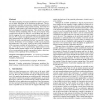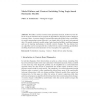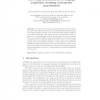1407 search results - page 89 / 282 » Learning Abstract Scheduling Models |
132
Voted
AGENTS
1999
Springer
15 years 6 months ago
1999
Springer
Most work on intelligent information agents has thus far focused on systems that are accessible through the World Wide Web. As demanding schedules prohibit people from continuous ...
140
Voted
PPOPP
2009
ACM
16 years 3 months ago
2009
ACM
The efficient mapping of program parallelism to multi-core processors is highly dependent on the underlying architecture. This paper proposes a portable and automatic compiler-bas...
127
Voted
IICAI
2007
15 years 3 months ago
2007
Structured Hidden Markov Models (S-HMM) are a variant of Hierarchical Hidden Markov Models; it provides an abstraction mechanism allowing a high level symbolic description of the k...
138
Voted
JCST
2010
14 years 9 months ago
2010
Abstract We define a notion of context that represents invariant, stable-over-time behavior in an environment and we propose an algorithm for detecting context changes in a stream ...
123
click to vote
TSD
2009
Springer
15 years 9 months ago
2009
Springer
Abstract. The discovery of words by young infants involves two interrelated processes: (a) the detection of recurrent word-like acoustic patterns in the speech signal, and (b) cros...



